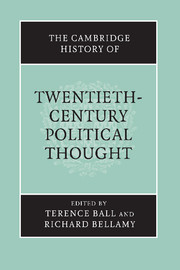Book contents
- Frontmatter
- Editors’ introduction
- Part I The changing fortunes of liberal democracy
- Part II Varieties of Marxism
- 10 The Second International: socialism and social democracy
- 11 The Russian Revolution: an ideology in power
- 12 Asian communism
- 13 Western Marxism
- 14 French Marxism – existentialism to structuralism
- Part III Science, modernism and politics
- Part IV New social movements and the politics of difference
- Part V Beyond Western political thought
- Biographies
- Bibliography
- Subject index
- Name index
- References
13 - Western Marxism
from Part II - Varieties of Marxism
Published online by Cambridge University Press: 28 March 2008
- Frontmatter
- Editors’ introduction
- Part I The changing fortunes of liberal democracy
- Part II Varieties of Marxism
- 10 The Second International: socialism and social democracy
- 11 The Russian Revolution: an ideology in power
- 12 Asian communism
- 13 Western Marxism
- 14 French Marxism – existentialism to structuralism
- Part III Science, modernism and politics
- Part IV New social movements and the politics of difference
- Part V Beyond Western political thought
- Biographies
- Bibliography
- Subject index
- Name index
- References
Summary
Introduction
The character of Marxism in Europe during the middle of the twentieth century was profoundly marked by the collapse of the Second International in 1914 and by the defeat of the working-class movements in Western Europe in the following two decades. This collapse meant that the centre of gravity of Marxist thought initially moved east, where it was soon suppressed by the rise of Stalin. Unlike the previous generation of Marxist theoreticians, most of the thinkers grouped under the rubric of ‘Western’ Marxism were not important figures in political parties. They tended to be academics rather than activists, writing in a period of declining working-class activity and therefore in comparative isolation from political practice. Thus philosophy, epistemology, methodology and even aesthetics bulk larger in their works than do politics or economics – though all were insistent on the political implications of even their most abstruse writings. In a period when parliamentary democracy became normal throughout the advanced capitalist countries and their economies enjoyed a period of unprecedented growth, an atmosphere of resigned pessimism spread among many Marxist intellectuals – a pessimism that was not alleviated by considering the repressive nature of Soviet bureaucracy. Geographically, Marxist thought was concentrated in Germany, France and Italy, countries with large Communist parties. Whereas Marx started with philosophy and moved to economics, the typical thinkers of Western Marxism have moved in the opposite direction and in some cases sought inspiration in philosophers anterior to Marx – Spinoza, Kant and, above all, Hegel.
- Type
- Chapter
- Information
- The Cambridge History of Twentieth-Century Political Thought , pp. 282 - 298Publisher: Cambridge University PressPrint publication year: 2003
References
- 3
- Cited by

